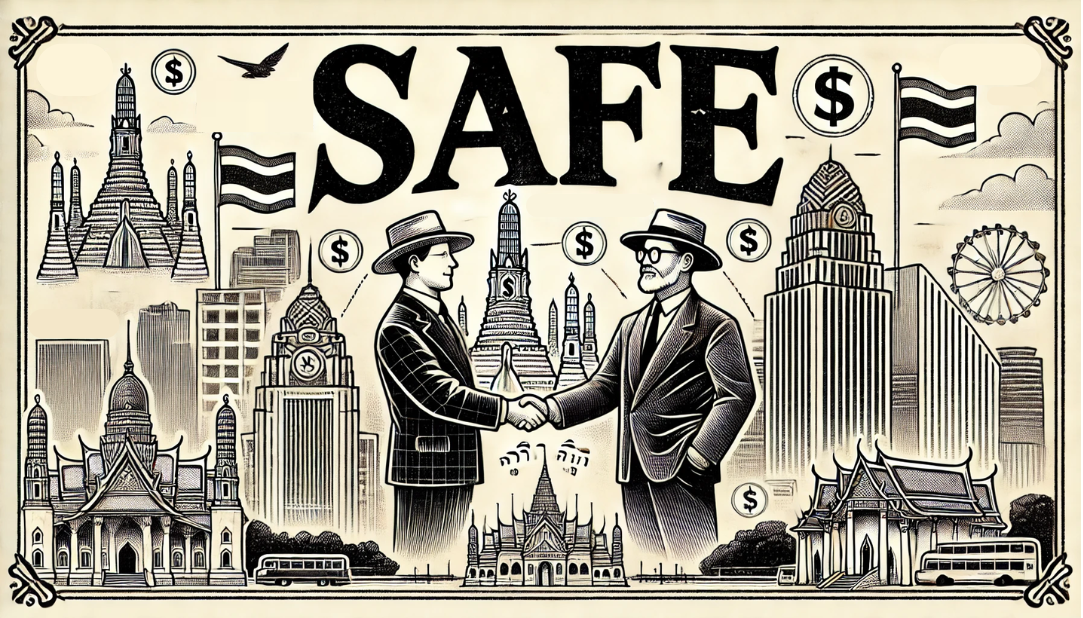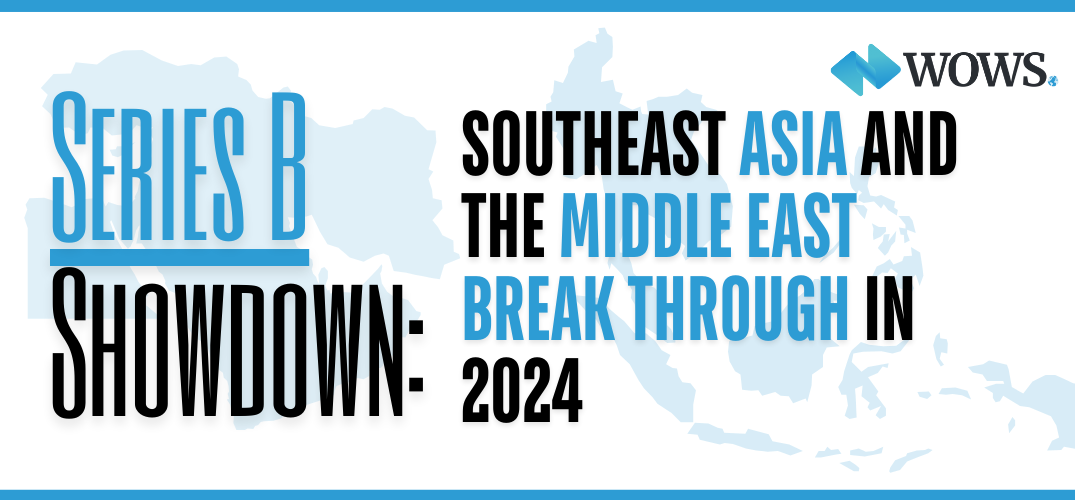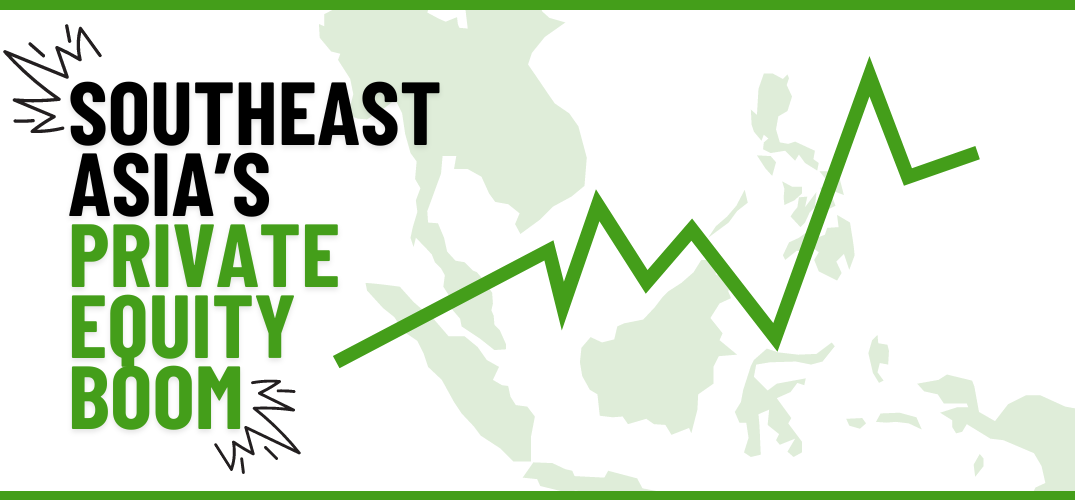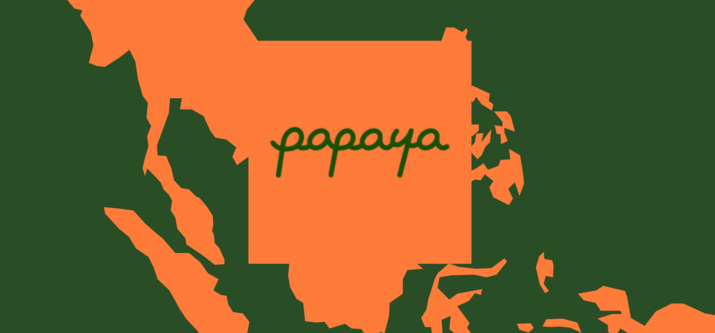Surfing the SAFE Wave: How Thailand's Startups Are Riding High
SAFE agreement Thailand startups Southeast Asia 6 minutes

In the ever-evolving world of startup financing, Southeast Asia, particularly Thailand, is no stranger to innovative funding mechanisms. Among these, the SAFE (Simple Agreement for Future Equity) has emerged as a potent tool for startups looking to raise early-stage capital. Originally designed by Y Combinator, the SAFE is a streamlined alternative to the more cumbersome convertible note, offering a quicker and more flexible way to secure funding. But how does this Silicon Valley export hold up in the intricate legal and economic landscape of Thailand?
What is a SAFE?
A SAFE is essentially a promise between a startup and an investor: the investor provides capital now, with the promise of equity in the future, typically during the next significant financing round. Unlike convertible notes, SAFEs do not accrue interest, nor do they have a maturity date, making them less burdensome for fledgling companies. They’re simple, efficient, and have gained significant traction in global startup ecosystems.
However, the legal landscape in Thailand presents unique challenges. The country’s Civil and Commercial Code (CCC) does not explicitly accommodate SAFEs, particularly when it comes to issuing convertible shares or options for future shares. This means that while SAFEs can be utilized, they require a bit of legal maneuvering to align with Thai law, often involving indirect mechanisms or creative legal structuring (KrASIA).
How Are SAFEs Being Used in Thailand?
Despite these legal complexities, SAFEs have found their footing in Thailand’s burgeoning startup scene. Startups here are increasingly turning to SAFEs as a way to attract early-stage investors without the immediate complications of equity dilution or debt repayment. This is particularly appealing in a market where early-stage funding is competitive, and startups need to move quickly to secure capital.
For instance, in 2023, Thai-based tech startups like ZTRUS and FinVest raised seed funding through SAFEs, allowing them to bypass the lengthy negotiations often associated with equity financing. These SAFEs were structured with valuation caps and discount rates that provided early investors with the potential for significant upside, while also giving startups the flexibility they needed to scale rapidly (Business News Asia).
The Appeal and Risks of SAFEs
SAFEs in Thailand offer several advantages, particularly their simplicity and the speed at which they can be executed. For startups, they provide a way to raise funds without immediately giving away equity or taking on debt. For investors, they offer a path to equity in promising startups, often at a favorable discount.
But it’s not all smooth sailing. One of the key risks associated with SAFEs is the lack of guaranteed returns. If a startup fails to reach a triggering event, such as a Series A round or an acquisition, investors may find themselves holding a worthless agreement. This risk is particularly pronounced in Thailand, where the startup ecosystem, while growing, is still maturing and not all ventures reach the scaling stages that trigger SAFE conversions (e27).
Navigating the Legal Landscape
Given the Thai CCC’s restrictions on issuing convertible shares, SAFEs in Thailand often require a creative approach. Legal experts recommend structuring SAFEs to align with permissible mechanisms under Thai law, such as linking the SAFE to an increase in the company’s registered capital or issuing preference shares. This ensures that the agreement remains enforceable while still providing the benefits of a SAFE (CreationsForU).
The Future of SAFEs in Thailand
As Thailand’s startup ecosystem continues to grow, the use of SAFEs is likely to increase. The flexibility and simplicity they offer are well-suited to the fast-paced world of startups, where time is often more valuable than money. However, it’s crucial for both startups and investors to understand the legal nuances and risks associated with SAFEs in Thailand.
In a landscape where innovation is key, SAFEs represent a bold, if risky, approach to funding. For the right startup, they offer a lifeline of capital that can mean the difference between scaling up or shutting down. But as with all things in the startup world, it’s a gamble—a calculated one, but a gamble nonetheless.
Final Thoughts from WOWS:
The surge in SAFE usage in Thailand is a testament to the region's adaptability and hunger for growth. As the ecosystem matures, we expect to see more creative solutions to navigate the unique challenges posed by local regulations. For now, SAFEs offer a beacon of hope for startups looking to scale quickly, but as always, tread carefully and stay informed.
Sources:
Ready to Learn More About SAFE Notes?
At WOWS Global, we specialize in helping startups simplify their funding process through customized SAFE notes. Our team provides expert guidance, legal compliance, and personalized support to ensure your investment agreements are founder-friendly and investor-ready.
To find out more, visit our SAFE Note page or schedule a no-obligation chat with one of our experts today to discuss how we can assist with your startup's funding needs.
Related Posts
-

Series B Southeast Asia Middle East 4 minutes
Series B Showdown: Southeast Asia and the Middle East Break Through in 2024
In a world where raising venture capital feels like pulling teeth, Southeast Asia and the Middle East have become unlikely champions. Specifically, we’re talking about Series B funding—the so-called "make or break" round where startups are expected to have proven product-market fit and demonstrated strong growth metrics. Data from Carta shows a global drop in Series B funding, particularly in the U.S. market, where only the most capital-efficient companies are managing to score checks. But for founders in Southeast Asia and the Middle East, 2024 is shaping up differently. Series B, once a hard sell in these regions, is now a coveted target and, more importantly, an achievable milestone. Let’s break it down. -

Southeast Asia SME Lending Mergers Sustainability 6 minutes
Southeast Asia’s Investment Frenzy in September 2024: Startups Thriving Across Sectors
September 2024 has been a landmark month for Southeast Asia’s startup scene, with significant investments across fintech, AI, sustainability, and EVs. Learn how these industries are driving the region’s innovation. -

Papaya startup hospitality tech Southeast Asia 5 minutes
Papaya's Expansion: A Fresh Take on Hospitality Tech in Southeast Asia
Papaya, a fintech startup from Thailand, is revolutionizing the hospitality industry in Southeast Asia. With fresh funding from BEENEXT and A2D Ventures, Papaya is ready to scale its digital ordering and payment platform across the region. -

Southeast Asia Startup Ecosystem
Exploring Southeast Asia's vibrant Startup Ecosystem
Southeast Asia is home to a bustling startup ecosystem that is rapidly evolving and capturing the attention of investors and entrepreneurs alike. With its thriving economies, growing middle-class population, and increasing internet and smartphone penetration rates, the region offers immense potential for innovation and business growth. -

Startup Investment Southeast Asia
Why Southeast Asia is the Next Hotspot for Startup Investments
Southeast Asia is rapidly emerging as one of the world’s most promising regions for startup investments. With a growing population, a rising middle class, and a rapidly expanding digital economy, Southeast Asia presents a wealth of opportunities for investors looking to tap into this dynamic and rapidly evolving market. In this article, we’ll take a closer look at why Southeast Asia is the next hotspot for startup investments. -

Startup Investments Southeast Asia
How to Navigate the Legal and Regulatory Landscape for Startup Investments in Southeast Asia
Southeast Asia is a vibrant and rapidly-growing region that is home to some of the world's fastest-growing economies. As a result, it is an attractive destination for startups and investors looking to tap into the region's potential. However, navigating the legal and regulatory landscape can be challenging, especially for first-time investors. In this article, we will discuss the key legal and regulatory considerations that investors need to keep in mind when investing in startups in Southeast Asia.
